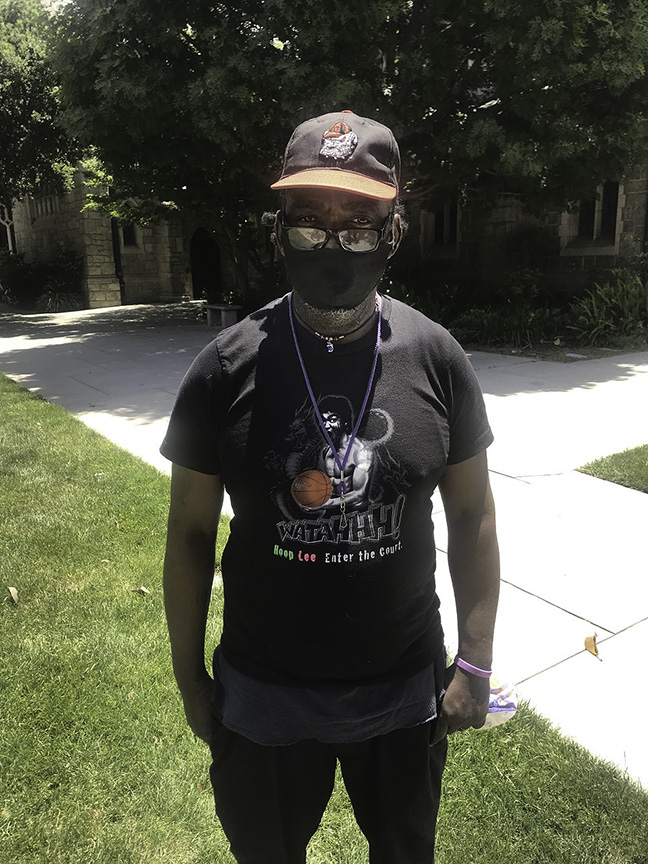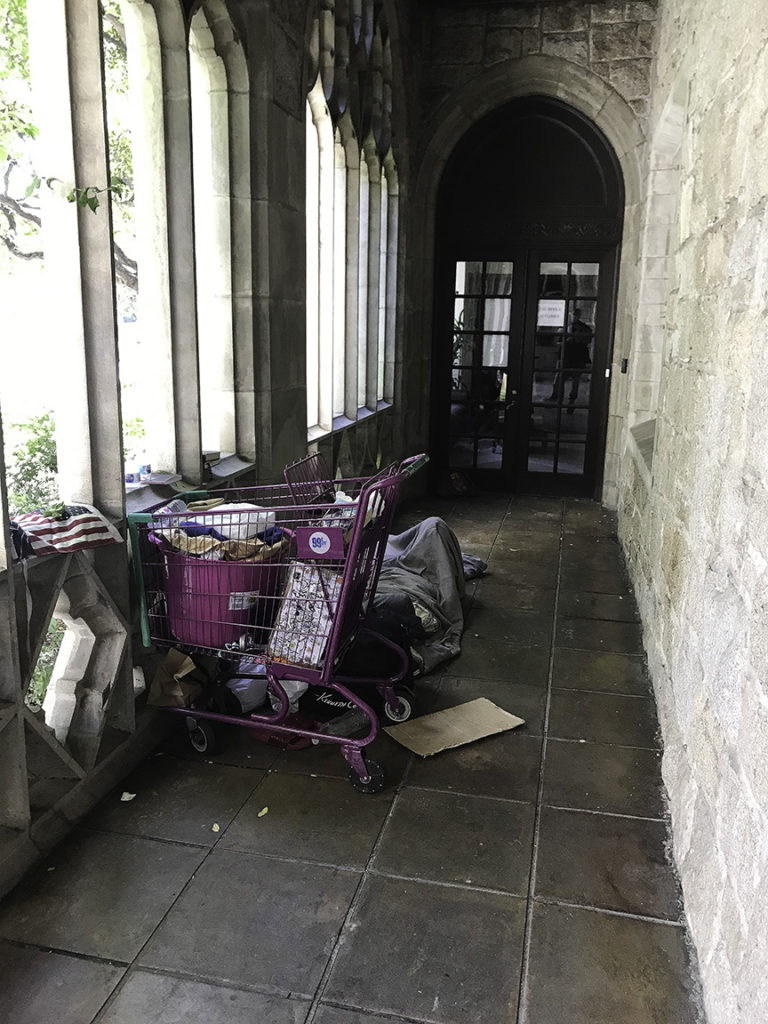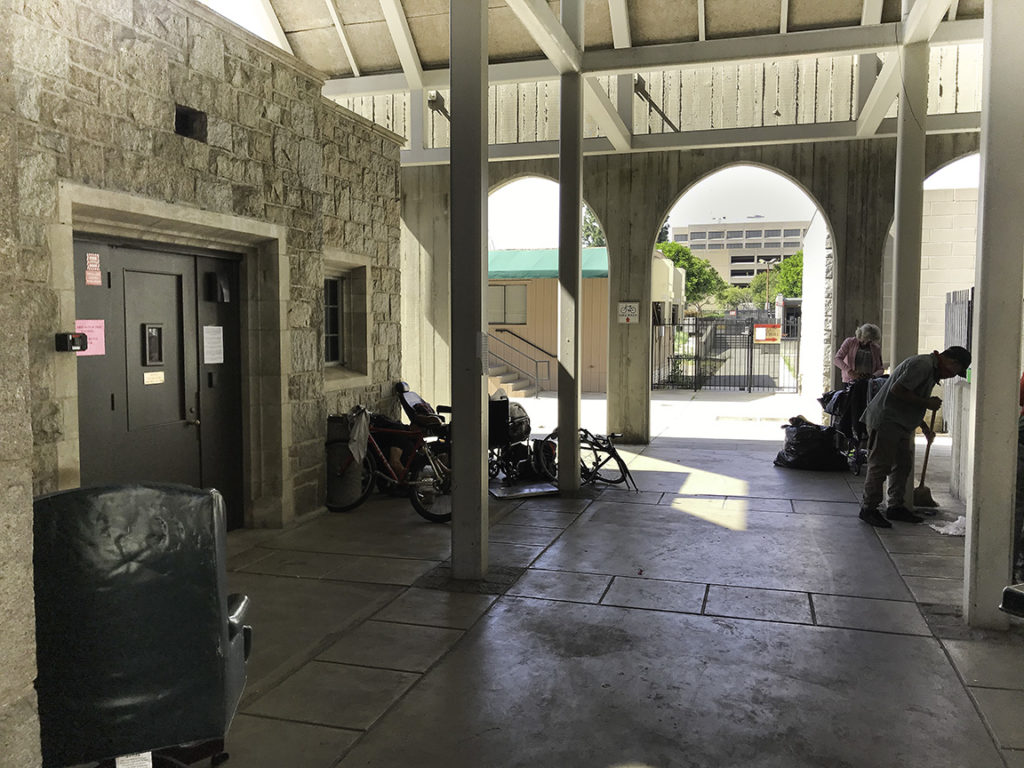
J.B., who was living on the streets in Pasadena, has found a safe haven at All Saints Church, Pasadena. Photo: Mike Kinman
Before the coronavirus, J.B.’s home had been on Pasadena city streets.
“I stayed down on Del Mar and Pasadena Street,” J.B., 60, told The Episcopal News recently. When efforts to halt the virus’s spread forced closure of local restaurants, offices, and public restrooms, he discovered a new home, a dedicated space at All Saints Church.
“The banner on our front lawn says, ‘All Saints welcomes all refugees,’ and thank God, people started taking us seriously,” said All Saints’ rector, the Rev. Mike Kinman. “They realized All Saints Church was a place they could come and stay.
“If you have nowhere else to go, church should always be a place that says, okay you can stay here,” Kinman added. “Our primary concern was providing a safe place, because sleeping on the street is dangerous.”
Kinman and others at the 3,000-member congregation, renowned for its outspoken advocacy and unabashed social activism, say caring for society’s most vulnerable — especially during the pandemic — is the least the church can do.
For instance, there’s retired Arcadia elementary school teacher Dan Bump, 60, who volunteers weekly at the church “to be the trash picker-upper.”
“Volunteering in this way just makes me feel even better about being a member of All Saints,” Bump told EN recently. “In this era of NIMBY — not in my backyard — this is a complete yes, in my front yard, and I feel really good about that.”
‘A complete yes, in my front yard’
Three months ago, J.B. joined a group of about 15 who had been living on the church campus, some for as long as a year.
“This is a good church, that cares about the homeless,” J.B. said. “A friend of mine brought me here. It’s better than being on the streets. It gets rough sometimes and you have your moments that you pray. A few of us try to help out as much as we can.”
The group camps out, from the parking lot to the atrium, equipped with waterproof sleeping bags and blankets, some using plastic tarps and shopping carts for privacy and a sense of security.
They are the church, Kinman said.

All Saints Church, Pasadena, has made areas of its campus available to unhoused neighbors in recent weeks as businesses and public facilities have been closed due to the coronavirus quarantine and shutdown. Photo: Mike Kinman
“These are members of the All Saints community. This isn’t some sort of subset of people that we who are the true community are helping,” he said. “They are drawn to All Saints the same way anyone is drawn to a church. The question is, how do we care for this portion of our community?”
Caring for the group is about becoming beloved community together, he said. And it can be complicated, deeply enriching, and sometimes messy. It involves “moments of incredible beauty and generosity, but it isn’t something you romanticize, because it can be really hard.”
Their life together, for example, ranges from ensuring for such basic needs as food, water, security and waste disposal, to engaging theological conversations and activating community covenants.
Over time and, especially in the age of coronavirus, a parish food ministry has morphed from Sunday sweets and a Monday hot meal into grocery gift card giveaways and pre-packaged to-go boxes, according to volunteer coordinator Erica Tambly.
“There is a Ralphs grocery store four blocks from All Saints, so we provide $10 gift cards … [which can] buy a rotisserie chicken and some mac and cheese,” said Tambly who, along with her spouse Marilyn Coffman, has coordinated the ministry for about eight years.
The grocery gift card giveaways have risen from an initial 20 weekly to about 143 on May 24, she said. Additionally, 54 masks were distributed along with bottles of water and pairs of socks.
Hoses make water available, and the congregation installed a port-a-potty with a washing station on its campus. Some residents like J.B. help clear away trash and mop up human waste. “What’s been wonderful is that people who are living here day in and day out, night in and night out, take a protective pride in the facility,” Kinman said.
Church members also provide volunteer clean-up duty, about which Kinman is philosophical: “Ultimately, the church isn’t a museum, we have to ask what is it for and if we’re worried so much about keeping it pristine that we don’t use it, then that’s not really church.”
Similarly, the church tapped a local security company to make twice-daily campus checks, “to help people settle down in areas that will be safe for them, like not next to the electrical generator,” Kinman said.
Additionally, covenants are necessarily created.
“You have to have conversations that, as a community, you can’t light a fire, or do things like use drugs,” he said. “And drug use is a part of people’s lives and it’s messy. Everyone’s life is a mess. Some of us are just better at hiding it than others. You get to know the messiness of people’s lives and then you get to see what it means to do life together. At its best, it is managed chaos, but it is also wonderful.”
Kinman says that he always offers opportunities for their unhoused guests to get into rehabilitation, but those staying at All Saints must agree not to smoke or to buy, sell or use drugs on church property. If they need to use drugs, he tells them, they must leave the campus to do so and return afterward.
As in any community, there is conflict, and in the age of coronavirus, the added challenge to mediate while social distancing.
Most importantly, Kinman said, “we get to know each other’s names and listen to each other, have theological conversations saying basically, I am going to treat you like an image of God because that’s what you are and we’re going to love each other.
“Love is the most disarming thing in the world and our default is we’re just going to love you.”
The church is also partnering with Union Station Homeless Services and the Los Angeles County Homeless Services Authority’s Project Roomkey, which seeks to house those experiencing homelessness and to help prevent the spread of COVID-19.
Ultimately J.B. is hoping to find more permanent housing. His friend Marcy, whom he met at All Saints, was just placed in a motel in another city, he said.
“She has a broken leg right now and can’t really move around. It’s a good thing they put her in the hotel. I hope I can be placed there, too. It would make me and her so happy to be together again.”

People staying on the All Saints, Pasadena, campus help to clean and maintain the property as a gift to the church community that has welcomed them. Photo: Mike Kinman
